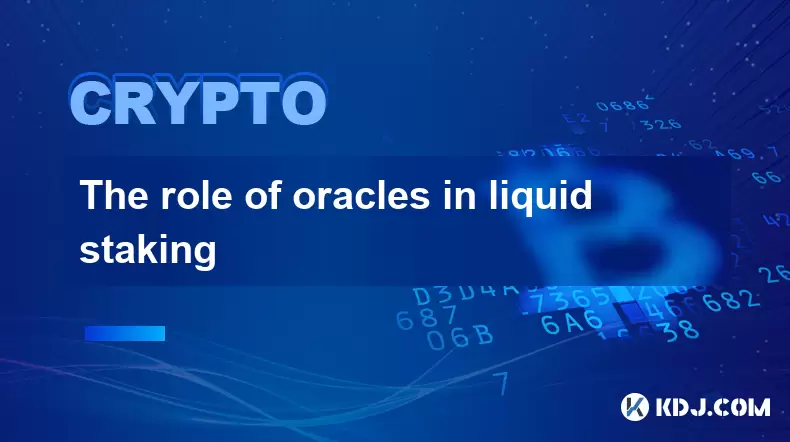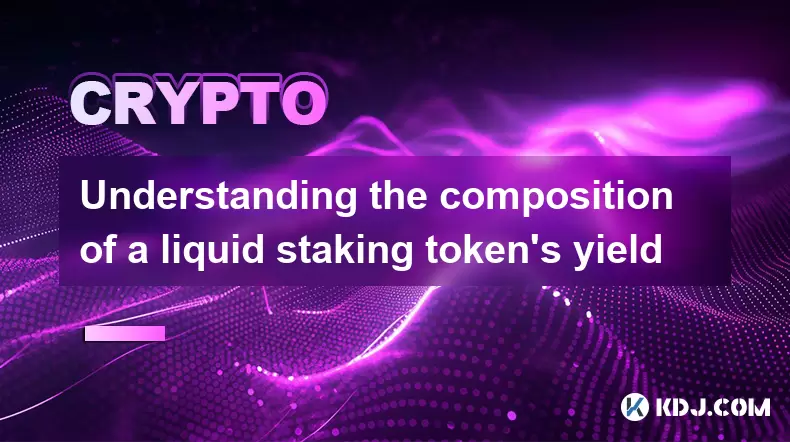-
 bitcoin
bitcoin $87959.907984 USD
1.34% -
 ethereum
ethereum $2920.497338 USD
3.04% -
 tether
tether $0.999775 USD
0.00% -
 xrp
xrp $2.237324 USD
8.12% -
 bnb
bnb $860.243768 USD
0.90% -
 solana
solana $138.089498 USD
5.43% -
 usd-coin
usd-coin $0.999807 USD
0.01% -
 tron
tron $0.272801 USD
-1.53% -
 dogecoin
dogecoin $0.150904 USD
2.96% -
 cardano
cardano $0.421635 USD
1.97% -
 hyperliquid
hyperliquid $32.152445 USD
2.23% -
 bitcoin-cash
bitcoin-cash $533.301069 USD
-1.94% -
 chainlink
chainlink $12.953417 USD
2.68% -
 unus-sed-leo
unus-sed-leo $9.535951 USD
0.73% -
 zcash
zcash $521.483386 USD
-2.87%
The role of oracles in liquid staking
Oracles ensure accurate reward distribution and security in liquid staking by providing real-time, trusted data to smart contracts.
Jul 22, 2025 at 09:56 am

Understanding Liquid Staking and Its Core Components
Liquid staking is a mechanism in the blockchain ecosystem that allows users to stake their cryptocurrencies without locking up their assets. This innovation enables users to retain liquidity while participating in staking rewards. The core components of liquid staking include staking derivatives, smart contracts, and decentralized finance (DeFi) integrations. However, one of the most critical elements often overlooked is the role of oracles.
Oracles act as bridges between on-chain and off-chain data sources. In the context of liquid staking, they are essential for ensuring that the system accurately reflects real-time staking conditions, validator performance, and reward distribution.
How Oracles Enable Accurate Reward Distribution
One of the primary functions of oracles in liquid staking is to fetch real-time data about staking rewards and validator performance. Without accurate data, liquid staking platforms would be unable to distribute rewards fairly among users.
- Oracles retrieve data from the underlying blockchain, including block rewards, slashing events, and uptime metrics.
- They verify validator performance and ensure that only legitimate rewards are distributed.
- Smart contracts use this data to mint or burn liquid tokens that represent the staked assets and their accrued rewards.
This process ensures that users receive the correct amount of rewards without relying on centralized intermediaries.
Ensuring Security Through Trusted Data Feeds
Security is a paramount concern in liquid staking systems. Since users deposit real assets into a protocol and receive a tokenized version in return, any manipulation or delay in data can lead to significant losses.
- Oracles provide trusted data feeds that are resistant to manipulation and tampering.
- Multiple oracles are often used in a decentralized oracle network to prevent single points of failure.
- These networks cross-verify data before feeding it into the smart contract layer.
By ensuring that only accurate and timely data is used, oracles help maintain the integrity of the entire liquid staking ecosystem.
Facilitating Cross-Chain Interoperability
Many liquid staking platforms aim to operate across multiple blockchains. Oracles play a pivotal role in enabling cross-chain communication by relaying data between different networks.
- Oracles act as validators for data originating from other chains, ensuring that staking events on one chain can be represented accurately on another.
- They translate data formats to ensure compatibility between different blockchain protocols.
- This enables liquid staking tokens (LSTs) to be used in DeFi protocols on different chains without requiring native staking on each network.
This cross-chain functionality significantly enhances the utility of liquid staking tokens and expands the reach of staking derivatives.
Handling Slashing Events and Risk Mitigation
Slashing is a penalty mechanism used in proof-of-stake blockchains to deter malicious behavior by validators. Liquid staking protocols must account for these events to protect user assets.
- Oracles monitor validator behavior and detect slashing events in real time.
- When a slashing occurs, the oracle updates the smart contract to adjust the value of the liquid staking token accordingly.
- Users are informed promptly about any potential losses due to validator misconduct.
This dynamic adjustment mechanism ensures that users are not overexposed to risk and that the system remains solvent even in the event of validator failures.
Challenges and Considerations in Oracle Integration
While oracles are essential, integrating them into liquid staking systems comes with challenges.
- Data latency can affect the timeliness of reward distribution and slashing updates.
- Oracle centralization poses a risk if a single entity controls the data feed.
- Protocols must implement redundancy and decentralization strategies to mitigate these risks.
Careful design and implementation are necessary to ensure that oracles contribute positively to the security and efficiency of liquid staking platforms.
Frequently Asked Questions
What happens if an oracle provides incorrect data?Liquid staking protocols often use multiple oracles and consensus mechanisms to verify data accuracy. If an oracle provides incorrect data, it can be flagged and replaced, and the system can rely on other oracles to ensure continuity and correctness.
Can oracles be manipulated in a liquid staking environment?While manipulation is a concern, most protocols implement cryptographic verification, economic incentives, and decentralized oracle networks to reduce the risk of data tampering and ensure trustless operation.
Are all liquid staking protocols required to use oracles?Not all liquid staking protocols rely on external oracles. Some use on-chain data directly or validator-based reporting. However, for advanced features like cross-chain interoperability and real-time reward tracking, oracles are typically essential.
How do oracles affect the value of liquid staking tokens?Oracles directly influence the token price and redemption rate by providing accurate data on staking rewards, validator performance, and slashing events. Any delay or inaccuracy in oracle data can cause discrepancies in token valuation.
Disclaimer:info@kdj.com
The information provided is not trading advice. kdj.com does not assume any responsibility for any investments made based on the information provided in this article. Cryptocurrencies are highly volatile and it is highly recommended that you invest with caution after thorough research!
If you believe that the content used on this website infringes your copyright, please contact us immediately (info@kdj.com) and we will delete it promptly.
- Tokenization, Stablecoins, Remittances: The New York Minute for Global Finance
- 2026-02-01 19:20:01
- BlockDAG Poised for 100x Crypto Opportunity as Presale Enters Final Hours, Promising Massive Gains
- 2026-02-01 19:20:01
- Circle Charts Bold Course: Stablecoins to Reshape Global Finance by 2026
- 2026-02-01 19:25:01
- Big Apple Bites into Blockchain: Ethereum DApps, Exchanges, and Games Navigate a Shifting Crypto Tide
- 2026-02-01 19:15:01
- Cryptocurrency Presales and Pumpfun: The Big Apple's Bold Bet on Digital Gold Rush
- 2026-02-01 19:15:01
- Pi Network Bolsters Mainnet Migration and KYC Enhancements Amidst Ecosystem Growth
- 2026-02-01 19:10:02
Related knowledge

Understanding the composition of a liquid staking token's yield
Jul 20,2025 at 09:07am
What Is a Liquid Staking Token?A liquid staking token is a representative asset issued to users who stake their native cryptocurrency on a proof-of-st...

Is it better to stake directly or use a liquid staking service?
Jul 22,2025 at 08:21pm
Understanding the Basics of StakingStaking in the context of blockchain and cryptocurrency refers to the process of locking up digital assets to suppo...

What to do during an LST depeg event
Jul 20,2025 at 04:57pm
Understanding LST Depeg EventsAn LST (Liquid Staking Token) depeg event occurs when the token, which is typically pegged to the value of the underlyin...

How to find new liquid staking projects
Jul 30,2025 at 01:14pm
Understanding Liquid Staking and Its ImportanceLiquid staking is a mechanism that allows users to stake their cryptocurrency assets while still mainta...

Can you provide liquidity with liquid staking tokens?
Jul 22,2025 at 10:22am
Understanding Liquid Staking TokensLiquid staking tokens (LSTs) are derivative tokens that represent staked assets on a proof-of-stake (PoS) blockchai...

What are the best wallets for storing LSTs?
Jul 21,2025 at 03:14pm
Understanding LSTs and the Need for Secure StorageLSTs, or Liquid Staking Tokens, are derivative tokens representing staked assets on a blockchain. Wh...

Understanding the composition of a liquid staking token's yield
Jul 20,2025 at 09:07am
What Is a Liquid Staking Token?A liquid staking token is a representative asset issued to users who stake their native cryptocurrency on a proof-of-st...

Is it better to stake directly or use a liquid staking service?
Jul 22,2025 at 08:21pm
Understanding the Basics of StakingStaking in the context of blockchain and cryptocurrency refers to the process of locking up digital assets to suppo...

What to do during an LST depeg event
Jul 20,2025 at 04:57pm
Understanding LST Depeg EventsAn LST (Liquid Staking Token) depeg event occurs when the token, which is typically pegged to the value of the underlyin...

How to find new liquid staking projects
Jul 30,2025 at 01:14pm
Understanding Liquid Staking and Its ImportanceLiquid staking is a mechanism that allows users to stake their cryptocurrency assets while still mainta...

Can you provide liquidity with liquid staking tokens?
Jul 22,2025 at 10:22am
Understanding Liquid Staking TokensLiquid staking tokens (LSTs) are derivative tokens that represent staked assets on a proof-of-stake (PoS) blockchai...

What are the best wallets for storing LSTs?
Jul 21,2025 at 03:14pm
Understanding LSTs and the Need for Secure StorageLSTs, or Liquid Staking Tokens, are derivative tokens representing staked assets on a blockchain. Wh...
See all articles
























![[Audio stories] Streamer Became a Billionaire Overnight After Buying One Junk Coin [Audio stories] Streamer Became a Billionaire Overnight After Buying One Junk Coin](/uploads/2026/02/01/cryptocurrencies-news/videos/origin_697eaa9a495ed_image_500_375.webp)

















































